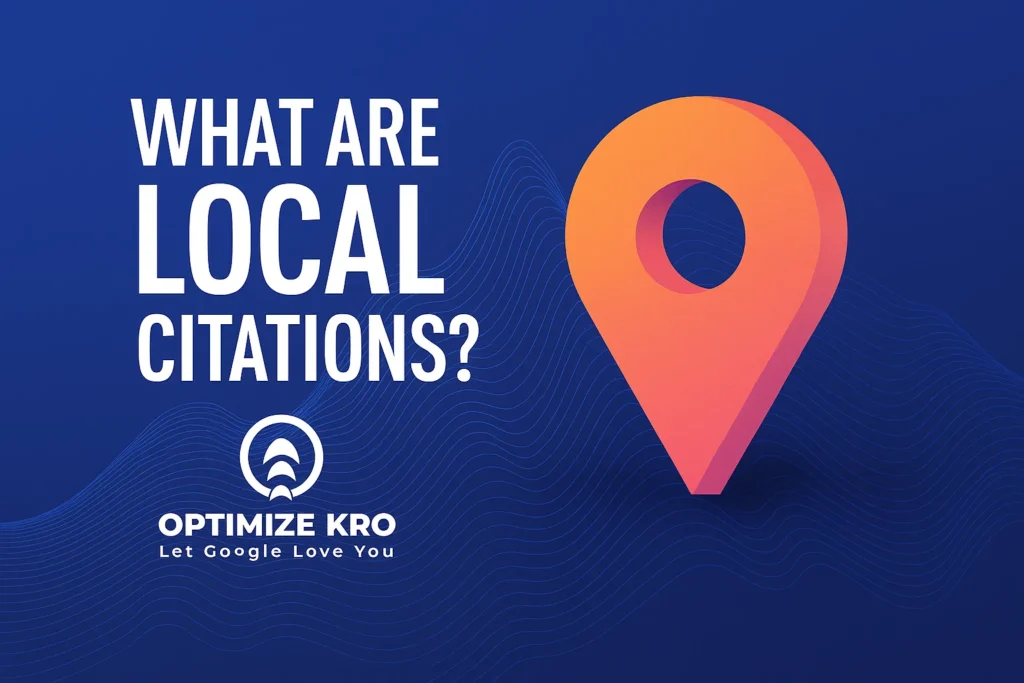What Are Local Citations?
Local citations is a part of Off-Page SEO are online references that mention a business’s name, address, and phone number (NAP). These mentions help search engines like Google understand where a business is located and what services it offers. A local citation is an important component of local SEO, influencing a website’s rankings in local search results.
The structure of local citations can vary. They could appear in directories, social media platforms, or even on blogs. But the key is that they provide critical NAP details, helping to establish trust and authority in a given area.

Why Are Local Citations Important for SEO?
Local citations are essential for several reasons:
- Improved Local Search Rankings: Google uses local citations to verify the accuracy of business information. If your business is listed across multiple trusted websites, search engines view this as a signal of credibility, which can improve your local rankings.
- Increased Visibility: Citations can drive traffic to your website by creating backlinks. Even if the citation is not directly linked to your website, it can bring in new potential customers who find you in directories and local listings.
- Enhanced Trust: Accurate and consistent citations increase a business’s trustworthiness. If your business appears on authoritative websites like Yelp, Yellow Pages, or BBB (Better Business Bureau), it enhances your credibility in the eyes of consumers.
- Competitive Advantage: A well-managed citation profile can help differentiate you from competitors. When Google sees consistent NAP across multiple platforms, it gives your business the advantage over others that may not be cited as widely.
Types of Local Citations
There are several types of local citations:
- Structured Citations: These citations are found in online directories where your business’s NAP is placed in a specific, standardized format. Examples include Yelp, Yellow Pages, and Foursquare.
- Unstructured Citations: These are mentions of your business that don’t follow a specific format. They could appear on blog posts, news articles, or other types of content. They may not always contain NAP information, but they still contribute to your online presence.
- Social Citations: Social media platforms like Facebook, Instagram, and LinkedIn often feature citations for businesses, either through direct listings or by mentioning them in posts.
- Local Listings and Directories: Websites such as Google My Business, Apple Maps, and Bing Places offer specialized local business directories that contain crucial citation information. These types of citations can significantly impact local SEO.
Key Elements of a Local Citation
A local citation typically contains the following:
- Business Name: This is the official name of the business, and it should be consistent across all platforms to avoid confusing customers and search engines.
- Address: The physical location of your business. It is essential that this is accurate and consistent across all citations to avoid confusing search engines.
- Phone Number: The main contact number for your business. Having a consistent phone number across various platforms builds trust.
- Website URL: A link to your business’s website.
- Business Hours: The days and times your business is open.
- Category: This identifies the industry or niche your business belongs to. Categories help search engines understand what your business does, aiding in better search results.
The Importance of NAP Consistency
One of the most crucial aspects of managing local citations is ensuring NAP consistency. The name, address, and phone number should be identical across all listings. Inconsistent information can confuse search engines, causing rankings to drop or your business to be omitted from search results altogether.
How to Build Local Citations
Building local citations involves several steps:
- Claim Your Google My Business Profile: This is one of the most critical citations you can have. By claiming and verifying your Google My Business listing, you enhance your chances of appearing in local search results, Google Maps, and the Local Pack.
- Submit to Popular Local Directories: Examples include Yelp, Yellow Pages, BBB, TripAdvisor, and local business directories related to your city, town, or state. These directories are trusted by search engines and customers alike.
- Local Chamber of Commerce: Joining your local chamber of commerce and getting listed on their website can significantly boost your local SEO efforts.
- Leverage Industry-Specific Directories: Certain industries have specialized directories (e.g., Healthgrades for healthcare, Avvo for legal services). Getting listed on these platforms can increase your visibility among potential customers in your field.
- Use Data Aggregators: Companies like Neustar Localeze, Acxiom, and Factual aggregate business data and distribute it across a wide network of local websites, improving your visibility.
- Ensure Accuracy: When submitting your business to any directory or listing, double-check for errors. Ensure that your NAP, website, and other details are 100% accurate.
Local Citation Audit
A local citation audit helps you keep track of where your business is listed online. This audit is necessary to ensure consistency and eliminate incorrect or outdated information.
How to Conduct a Citation Audit:
- List All Your Citations: Gather a comprehensive list of all the places your business is mentioned online.
- Verify the NAP Information: Check that all your NAP information is consistent across these platforms.
- Discrepancies: If you find any discrepancies (different phone numbers or addresses), correct them immediately.
- Claim Unlisted Citations: If your business is mentioned but not claimed, claim it to manage the information.
- Remove Duplicate Listings: Remove any duplicate listings that could confuse search engines.
What Our Clients Say
Trusted by contractors and local businesses for proven Local SEO Services.
John M. – General Contractor
“These guys transformed my Google Maps ranking. More calls, more local leads, and better visibility!”
Sarah L. – Roofing Business
“Within 3 months, my business went from page 3 to the top 3 listings. Highly recommend their Local SEO service!”
David K. – Plumbing Services
“Affordable and effective SEO. My local service calls doubled in less than 90 days.”
Local Citations Best Practices
To optimize local citations for SEO, follow these best practices:
- Keep NAP Information Consistent: Ensure that your name, address, and phone number are consistent across all platforms.
- Use Accurate Business Categories: When selecting a category for your business, choose the most relevant one. You can also select multiple categories if applicable.
- Add a Website URL: Always include your website’s URL to help drive traffic and improve SEO.
- Fill Out Profiles Completely: Don’t leave any section incomplete. The more information you provide, the more authoritative your business appears to search engines.
- Keep Citations Updated: If you move locations or change phone numbers, update your citations immediately to avoid confusion.
- Monitor Your Citations: Regularly check your citations for accuracy and ensure they reflect the most current business information.
What Our Clients Say
Trusted by contractors and local businesses for proven Local SEO Services.
John M. – General Contractor
“These guys transformed my Google Maps ranking. More calls, more local leads, and better visibility!”
Sarah L. – Roofing Business
“Within 3 months, my business went from page 3 to the top 3 listings. Highly recommend their Local SEO service!”
David K. – Plumbing Services
“Affordable and effective SEO. My local service calls doubled in less than 90 days.”
Table: Examples of Popular Local Citation Sources
| Citation Source | Description | Domain Authority |
|---|---|---|
| Google My Business | The most important local citation source | 100 |
| Yelp | A popular review and business directory | 93 |
| Yellow Pages | An old but trusted business directory | 90 |
| Social platform with business listings | 95 | |
| BBB (Better Business Bureau) | Trusted directory for businesses with a reputation for trust | 82 |
| Apple Maps | Apple’s local business listing platform | 100 |
| TripAdvisor | For businesses in the hospitality and travel industries | 92 |
| Foursquare | A location-based service used by businesses | 86 |
Local citations signal to search engines like Google that your business is trustworthy and relevant for local searches. Accurate and consistent citations can help improve your rankings in local search results.
Many local directories offer free listings, while others may charge for premium listings or additional features. However, free listings can still be very effective for local SEO.
You can use tools like Moz Local, BrightLocal, or Whitespark to find and audit your citations. These tools can also help you fix incorrect information.
Duplicate listings can confuse search engines. You should merge or delete duplicates and ensure your NAP information is accurate.
In most cases, you can claim and manage your listings on third-party websites. This allows you to ensure your NAP and other details are accurate and up-to-date.
You should update your citations whenever there is a change in your business, such as a change of address, phone number, or website URL. Regular audits of your citations are also recommended to ensure accuracy.
By actively managing and optimizing your local citations, you can improve your business’s local SEO, enhance visibility, and drive more customers. The key is ensuring that your business’s NAP information is consistent and accurate across the web.

Gulfam Qamar is a seasoned Local SEO expert with a proven track record of helping businesses boost their online visibility and dominate local search results. With deep expertise in Google Business Profiles, on-page optimization, and local citation strategies, Gulfam helps brands connect with nearby customers and grow sustainably. When he’s not optimizing websites, he’s sharing actionable SEO tips and insights to empower small businesses in the digital space.

